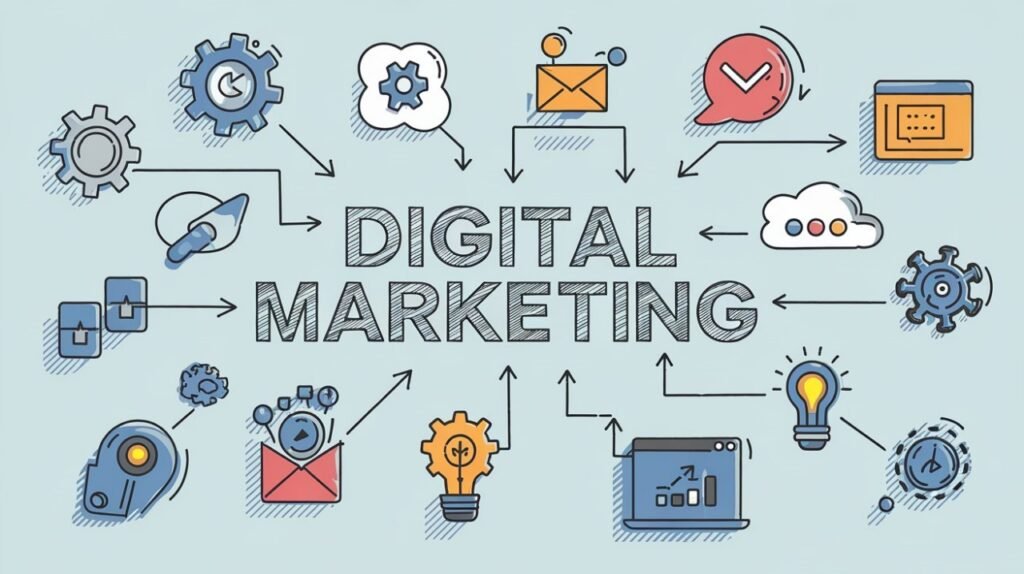What is a Digital Marketing Agency? – Digitechnoolabs XYZ
A digital marketing agency is a specialized firm that helps businesses grow their online presence. In today’s competitive market, simply having a website isn’t enough. Businesses need to actively reach their target audience, engage with potential customers, and boost their online visibility. This is where digital marketing agencies like Digitechnoolabs XYZ come into play. Discovering the Power of Digital Marketing: A Full Guide In today’s fast-moving digital world, businesses are always looking for new ways to connect with their audience, increase engagement, and grow profits. This is where digital marketing comes in. It uses different online channels and platforms to reach, engage, and convert potential customers. From search engine optimization (SEO) and social media marketing (SMM) to email and content marketing, each part of digital marketing helps businesses succeed in the online space. Getting to Know Digital Marketing: Digital marketing involves various strategies and techniques used to promote products, services, or brands through online platforms like search engines, social media, email, websites, and mobile apps. Unlike traditional marketing, which can have limited impact, digital marketing allows businesses to precisely target their audience, track results in real-time, and quickly adjust their approach as needed. Types of Digital Marketing: 1. Search Engine Optimization (SEO): SEO is the practice of improving a website to help it rank higher on search engine results pages (SERPs). This includes strategies like keyword research, on-page and off-page optimization, and technical tweaks. By optimizing their site for search engines, businesses can attract more organic visitors, gain potential customers, and boost their online presence and trustworthiness. Why SEO Matters:SEO is crucial for businesses that want to increase their online presence and draw in organic traffic. Since most people start their online searches with search engines, being at the top of the results can greatly enhance a business’s visibility and reputation. Plus, organic traffic usually converts better, making SEO a cost-effective, long-term strategy for steady growth. 2. Pay-Per-Click (PPC) Ads: PPC advertising lets businesses show ads on search engines or other platforms and pay a fee each time someone clicks on the ad. These campaigns can target specific keywords, audience groups, locations, and even user actions to reach the right people. Why PPC Advertising Matters:PPC advertising gives businesses quick visibility and results, making it a great way to drive traffic and increase sales right away. With detailed targeting options and real-time data, PPC campaigns can be fine-tuned for the best return on investment (ROI) and provide useful information about customer behavior and preferences. 3. Social Media Marketing (SMM): SMM involves using social media sites like Facebook, Instagram, Twitter, LinkedIn, and Pinterest to promote products or services, engage with customers, and increase brand awareness. It includes various methods, such as posting organic content, running paid ads, partnering with influencers, and managing community interactions. Why SMM Matters:Social media is now a big part of people’s everyday lives, giving businesses unique chances to connect with their target audience in a personal way. SMM helps companies show their human side, build relationships, and create genuine interactions with customers. Additionally, social media platforms offer strong advertising tools that allow businesses to reach specific audiences based on demographics, interests, and behaviors. 4. Content Marketing: Content marketing focuses on creating and sharing valuable, relevant, and consistent content to attract and keep a specific audience. This content can come in many forms, such as blog posts, articles, videos, infographics, podcasts, and eBooks, to meet different audience preferences. Why Content Marketing Matters:Content is key in the digital world and is essential for all online marketing efforts. Quality content not only informs and entertains but also builds trust and credibility with the audience. By offering useful information and addressing customer needs, businesses can position themselves as leaders in their industry and increase organic traffic to their websites. 5. Email Marketing: Email marketing is the process of sending promotional messages to a group of people through email, often to highlight products, services, or special offers. These email campaigns can be tailored to specific audience segments based on factors like demographics, behaviors, or previous interactions. Why Email Marketing Matters:Even with the growth of new communication methods, email remains one of the best ways to connect with customers and encourage sales. Email marketing helps businesses send targeted messages directly to their subscribers’ inboxes, building strong relationships and nurturing leads through personalized communication. It also offers valuable data on customer preferences, enabling businesses to improve their marketing strategies for better results. Final Thoughts: In summary, digital marketing provides businesses with many ways to connect with their target audience effectively. By using a complete digital marketing strategy that includes SEO, PPC advertising, social media marketing, content marketing, and email marketing, businesses can enhance their online presence, increase traffic, and successfully meet their marketing goals. Embrace digital marketing to discover endless opportunities for your business’s growth and success.
What is a Digital Marketing Agency? – Digitechnoolabs XYZ Read More »



